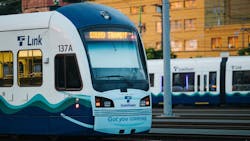‘Anarchist Jurisdictions’ sue Trump Administration over power to withhold federal funds
Three cities labeled “Anarchist Jurisdictions” by the Trump Administration have filed a lawsuit Oct. 22 with the U.S. District Court for the Western District of Washington questioning the validity of the Presidential Memorandum, “Reviewing Funding to State and Local Government Recipients of Federal Funds That Are Permitting Anarchy, Violence and Destruction in American Cities.”
The memorandum issued in early September directs the review and possible disfavoring of federal funding provided to state and local governments that have “permitted violence and destruction of property to persist and have refused to undertake reasonable measures to counteract criminal activities.”
Initially, New York City, Seattle, Portland, Ore., and Washington, D.C., carried the label before the nation’s capital was removed from the list.
The three cities argue congressionally appropriated funds cannot have conditions added by the executive branch without congressional authorization.
“The memo does not contain a single legal citation. There is no reference to any constitutional or statutory basis authority for the president to strip federal funding from the cities when he disagrees with their on-the-ground policing decisions or deems their budgeting choices unwise,” reads the lawsuit.
Additionally, the cities claim the designation “was made in an arbitrary and capricious manner based on a set of vague and subjective factors entirely within the U.S. Attorney General’s discretion.”
The cities are requesting removal of the “anarchist jurisdiction” designation and a halt to activities from the U.S. Department of Justice and Office of Management and Budget that would support the memorandum’s directives.
The tie-in to transit
Acting Administrator of the Federal Transit Administration K. Jane Williams is one of the lawsuit’s named defendants, along with President Donald Trump, Office of Management and Budget Director Russell Vought, Attorney General William Barr and Acting Secretary of the U.S. Department of Homeland Security Chad Wolf.
A Notice of Funding Opportunity (NOFO) from the Federal Transit Administration (FTA) published Oct. 8 for $10 million in grants through a new Public Transportation COVID-19 Research Demonstration Grant Program includes a clause incorporating the Presidential Memorandum directives into its evaluation criteria – potentially pushing transit agencies operating in the three cities out of consideration for much needed COVID-19 research grants.
The American Public Transportation Association (APTA) issued a statement last week strongly opposing the inclusion of the memorandum’s directives in the evaluation criteria. With APTA President and CEO Paul Skoutelas saying it was “inappropriate and unjustified” that the criteria could prohibit critical funds from reaching agencies as they fight against the COVID-19 pandemic.
The Commuter Rail Coalition (CRC) has also added its voice in opposition to the memorandum and urged FTA not to restrict applications from the three cities for COVID-19 research demonstration grants, noting “Americans in these cities deserve to be treated fairly and equally by their government.”
CRC points to New York Metropolitan Transportation Authority’s recent pilot project evaluating new air filtration and purification technology to determine its effectiveness in a commuter rail environment.
“The promise of this pilot signals the potential for a new industry standard for in-car filtration, killing not only COVID-19, but standard flu, the bacteria that causes the common cold and particulate matter,” said CRC.
The CRC explains it has become a clearing house for the results of chemical and application testing and pilot programs that its members have undertaken to enhance sanitation protocols in the face of COVID-19.
“Sharing test results reduces the duplication of effort – and duplicative spending of scarce resources – as does coordinated planning around grant applications for the FTA’s $10 million notice of funding opportunity for COVID-19 research, which a vital portion of our membership has been barred from applying,” said the coalition.
The Commuter Rail Coalition believes this is the time “for our government leaders to demonstrate they have all Americans’ interests at heart, and they should not exclude those who happen to live and work in certain geographic locations.”
Larry Penner, a former FTA employee out of the Region 2 New York office and current transportation advocate, writer and historian, called the inclusion of the memorandum's guidance to potentially withhold transit aid an "embarrassment" and believes support for mass transit is bipartisan.
"Public transportation funding has nothing to do with the previous civil disobedience, burning of buildings, rioting or looting that took place in Seattle, Portland and [New York City]. It would be insane to hold up future $1.5 billion in various FTA formula programs that the New York Metropolitan Transportation Authority will count on in federal fiscal year 2021 (October 1, 2020 – September 30, 2021). Support for mass transit, be it urban, suburban or rural, is bipartisan. There is virtually no congressional district that doesn’t have a number of public transit agencies and services. I can’t imagine that there is one member of [the House] or Senate who supports this FTA policy. Friends of public transportation hope at the end of the day it will not be enforced," said Penner.
-------------------
Story updated Oct. 23, 2:00 pm to incorporate comments from Larry Penner.
About the Author

Mischa Wanek-Libman
Group Editorial Director
Mischa Wanek-Libman is director of communications with Transdev North America. She has more than 20 years of experience working in the transportation industry covering construction projects, engineering challenges, transit and rail operations and best practices.
Wanek-Libman has held top editorial positions at freight rail and public transportation business-to-business publications including as editor-in-chief and editorial director of Mass Transit from 2018-2024. She has been recognized for editorial excellence through her individual work, as well as for collaborative content.
She is an active member of the American Public Transportation Association's Marketing and Communications Committee and served 14 years as a Board Observer on the National Railroad Construction and Maintenance Association (NRC) Board of Directors.
She is a graduate of Drake University in Des Moines, Iowa, where she earned a Bachelor of Arts degree in Journalism and Mass Communication.
